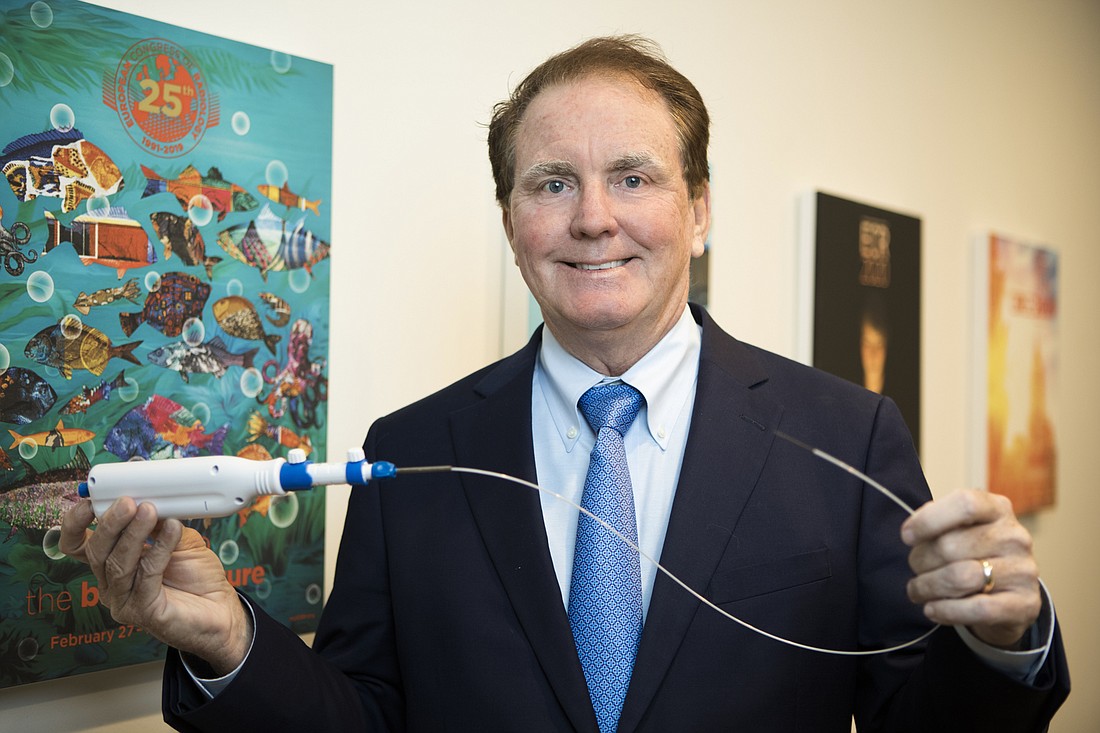- January 31, 2026
-
-
Loading

Loading

Dr. John Fisher, an interventional radiologist at Morton Plant Hospital in Largo and Mease Countryside Hospital in Safety Harbor, has created CytoCore, a medical device that makes biopsies faster, more efficient and less invasive for patients.
It’s not the first medical product he’s developed, nor will it be the last: In addition to his medical practice, Fisher owns and operates Praxis Medical Devices, a Tampa company that has designed and sold other innovative health care products such as BioSentry, a sealant system that prevents lung collapse during biopsies.
CytoCore, a disposable device that sells for around $100, harvests greater amounts of cellular material with fewer “passes,” or insertions into a patient’s body. Fisher, 62, says it’s commonly used in thyroid biopsies, which, using traditional methods, sometimes require five to six passes to collect an adequate tissue sample. Not only does that extend the time of a relatively simple procedure, but it’s also no fun for the patient.
“Obviously, that’s not comfortable,” Fisher says. “They get concerned; they want to know what’s wrong and why we aren’t getting enough material. So, it was low-hanging fruit for us. How can we make that procedure better and faster for patients? Everything we develop is patient-centered, because if you do what’s beneficial for the patient, everybody wins.”
Praxis Medical has won both FDA and CE approval for CytoCore, allowing it to be sold in the United States and Europe.
Fisher says a radiology conference in Barcelona, Spain, in September will include the presentation of a study about the effectiveness of CytoCore. The study found that in 96% of thyroid biopsies using CytoCore, adequate tissue sample was collected with one to two passes, while 60% of procedures required just a single pass.
“The average per-seat procedure time is under five minutes,” Fisher says. “So, patients are happy, the doctors are happy, everybody's happy.”
Like most, if not all, medical devices, regulatory approval was a major obstacle. But with 22 years of medical device design experience, Fisher was well acquainted with the process.
“There are so many different steps,” he says. “You have to deal with intellectual property, filing patents, the FDA. Basically you have to show the FDA that we thought about this and thought about that and tested this and tested that. You have to do testing on live animals showing that it didn't increase the risk of bleeding compared to a fine needle. And there's always hiccups along the way as far as manufacturing is concerned, things that need to be ironed out.”
With approval in hand, Praxis Medical then faced the challenge of getting doctors and other health care professionals up to speed on the benefits of CytoCore and how to use it, so there would be demand for the product. The system for doing so, Fisher explained, is quite different from, say, trying to get Wal-Mart to stock a new widget.
“The way it works in medicine, in the hospital, is you’ll have to trial something,” he says, “so you'll go in and do a bunch of cases. And then to get a device into a hospital, you have to go through purchasing departments.”
That means doctors can’t just request that their hospitals buy certain medical devices. A purchasing committee must approve all new products.
“There are a lot of hoops to jump through,” Fisher says, adding the COVID-19 crisis created yet another layer of complexity for the CytoCore rollout. “With COVID, most of those committees didn't allow anybody in the hospital. For two years none of our sales reps could go into hospitals. It hasn’t been talked about much, but the medical device industry suffered under COVID — luckily that’s now lifting.”
Fisher and his team of six employees have been up to the challenge, however: He says many hospitals all over the world are regularly using CytoCore. “I couldn’t tell you exactly,” he says, “but it’s several hundred, I’m sure.”
Praxis Medical’s gross revenue has been growing 20% year-over-year, says Fisher, who declines to disclose specific numbers. He expects that to continue and possibly increase as the company prepares to introduce its next product, EndoCore, which is similar to CytoCore but can be used in endoscopes and bronchoscopes, instruments that medical professionals use to examine the interior of blood vessels and organs such as the bladder, colon, lungs, stomach or uterus.
“That’s going to be a huge game changer,” Fisher says, “because core biopsy needles don't really exist for bronchoscopy or endoscopy.”
Praxis Medical plans to submit EndoCore for FDA approval sometime this summer. Which leads to an important question: How does Fisher plan to balance his medical practice with his growing business?
“I have a lot of great people who work for me,” he says with a laugh. “I'm sort of at the 30,000-foot level, but as far as the day-to-day operations, they handle taking orders, shipping and selling, training doctors and that sort of thing.”